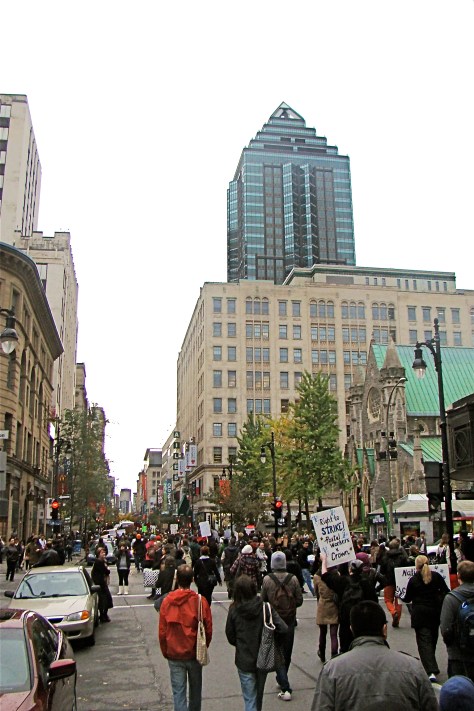My New Year is off to a phenomenal start.
Above is yet another great recent viral video coming out of my favourite goddam city. It features a municipal worker diligently clearing snow from a Villeray sidewalk. Except there’s no snow. Clearly our city’s efforts cut back on waste are getting off on the right foot.
Maisonneuve Magazine has popped the lid off a scandal we all assumed was going on, but dared not speak of. Perhaps people are fed-up, but it seems as though the snow-clearance operations of our already corrupt construction industry has been involved in significant bid-rigging for some time. Moreover, contractors and companies that don’t play ball face significant penalties, including intimidation, physical violence, fire-bombings and deliberate acts of sabotage. Click here for more; it’s an excellent if somewhat depressing read.
Another fantastic local viral video I’ve seen recently features local twit Jonathan Montalvo drunkenly trying to convince a gaggle of kids outside a bar how rich his dad is. He’s apparently getting into the club promotion scene, has t-shirts being printed and the like (he’s also got an agent, in case you’re interested in having this snot parade in front of your establishment accosting patrons and telling them how much better he is than them, a surefire way to attract the very finest locals). Unfortunately Mr. Popularity must have gotten cold feet of late, since just about video of the incident has been pulled from YouTube. I always find it adorable when memes get bashful.
Is this all it takes to secure $1,500 club appearance fees? Act like a gigantic dick?
Sometimes I don’t want to live on this planet anymore.
And the shame parade continues. I know I’m not ordinarily pessimistic, and on the whole I think I’m still optimistic in general for the New Year. I can’t expect to ever live a year without dealing with some kind of malaise, so it may as well coincide with this so-called seasonal affective disorder we’ve conveniently dreamed up to account for being miserable. How quaint – the disorder’s acronym is sad.
Above is footage from a massive fist-fight and dish/bottle/table/chair tossing mele at the New Dynasty Restaurant in Old Chinatown on New Year’s Eve. After watching this video a few times I can only say it’s doesn’t look to be so cut and dry Black vs. Chinese, and the SPVM has no idea what provoked the incident; no one’s talking, so it was probably some really dumb-as-shit argument between a small number of people that degenerated into a free-for-all. People don’t talk much when they’re ashamed of themselves – not much intervening going on as you can see.
Yesterday a 34 year-old man, homeless, possibly mentally-ill and apparently incapable of speaking French was shot and killed by the SPVM as he had apparently failed to stop and identify himself at the officer’s request. What his initial offense was is unclear, but the man, identified as Farshad Mohammadi did attack one of the intervening constables with a ‘sharp-edged weapon’ leaving superficial wounds on one officer. Mohammadi was fatally shot at the station but died later in hospital. I’m not saying the constable acted irresponsibly, but I wonder what drew their suspicions and why the SPVM isn’t encouraged to use ‘non-lethal’ suppression devices first and foremost. Unfortunately, the incident is being investigated by the Sureté du Québec, as is our foolish custom.
And then, to wrap up our little shit storm, tonight’s boneheaded protest of the hiring of Randy Cunneyworth. The Movement Québec francais demonstration in front of the Bell Centre drew a crowd of 300 out-to-lunch locals who would like the NHL, somehow, to accord the Canadiens more Francophone, Québecois players, and further to insist the Canadiens fire Cunneyworth, replace him with x and further eliminate English language music and announcements. If there’s one place government doesn’t need to stick its nose, it has to be the internationally successful modern game of ice-hockey and it’s hands-down finest professional team. The Canadiens may be in a bad slump, but it has nothing to do with Cunneyworth’s linguistic short-comings. Language and culture has absolutely nothing to do with how the Canadiens play, nor how the modern game of hockey is played at the professional level. Yet the demonstrators would like you to believe that a predominantly Québecois team would in fact do better. How, or why that would be the case, was not an issue the demonstrators were capable of illustrating.
There is a broader issue here – we need a winning sports team to keep our morale up, and we’ve been lucky, the Habs have had some exciting seasons recently. Moreover, the Bell Centre is consistently sold-out for Habs games, even live broadcasts of games played elsewhere. So while it sucks that our playoff chances are extremely slim, we need to get real here, it has nothing to do with Randy Cunneyworth’s inability to speak French.
It would have been nice to see those three-hundred people show up at Place du Peuple and support something worthwhile, by the way. Just another indicator what remains of the Indépendentiste movement is old and out of sync with the real problems of our world.
A discouraging start to the year. Here’s to better days ahead.









